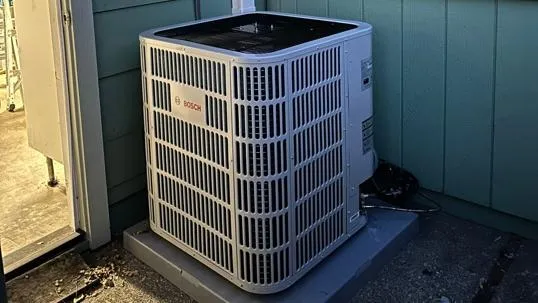Blog
Home / Blog

Heat Pump vs. Furnace - Which Should You Buy?
What's the Difference Between a Heat Pump and a Furnace?
A heat pump is an electric heat source used to provide heat to homes and buildings. It works by transferring heat from one place (usually the outdoors) to another (typically indoors). The heat pump is installed in an outdoor unit and takes heat from outside, moving it inside the home or building. In addition, a heat pump can also cool down interior rooms during summer months. For winter months when a heat pump cannot provide enough heat, an electric furnace or gas furnace is used as a supplement. An electric furnace uses electricity to generate heat while gas furnaces require gas, such as natural gas or propane. Both are reliable methods of consistently providing heat in colder temperatures when heat pumps cannot.
When it comes to heating options, an electric furnace and a gas furnace are two of the most popular choices. Both provide reliable and consistent heat, but they differ in how they generate that heat. An electric furnace uses electricity to generate heat while a gas furnace requires fuel such as natural gas or propane. Electric furnaces tend to be more efficient than their counterparts since no combustion is involved, however they can be expensive to operate due to high electricity costs. Gas furnaces on the other hand can be less expensive over time if natural gas prices remain low and you don’t mind dealing with carbon monoxide emissions from burning fuel for heat production. Ultimately, both types of furnaces have their advantages and disadvantages so it's important to consider your needs before making a decision about which type is best for you.
Pros and Cons: Heat Pump vs. Furnace
One of the main decisions a homeowner needs to make when considering heating options for their home is whether to install a furnace or a heat pump. While both provide energy efficiency and require some degree of maintenance, there are important differences between the two that should be considered. A furnace utilizes energy from energy sources such as natural gas to generate heat, making it more energy efficient than an electric resistance heater. A heat pump on the other hand uses electricity to move energy into or outside of the home enabling it to maintain higher energy efficiency levels in mild climates. Heat pumps also take up less space than furnaces do which can be especially helpful if space is limited. All of these factors should be taken into consideration when deciding between a furnace and heat pump.
Heat Pump Pros and Cons
Pros of Owning a Heat Pump:
- Can be more energy efficient than electric resistance heaters.
- Takes up less space than furnaces do, which can be especially helpful in limited spaces.
- Can double as an air conditioner in the summer months and provide cooling if necessary.
- Quiet operation due to fewer moving parts compared to furnaces.
Cons of Owning a Heat Pump:
- Generally more expensive upfront costs compared to other heating systems such as gas furnaces or boilers.
- Not effective in colder climates where temperatures drop below freezing for extended periods of time during winter months.
- Requires regular maintenance and servicing by a professional technician for optimal performance and efficiency levels.
Electric Furnace Pros and Cons
Pros of an Electric Furnace:
- Can be more energy efficient than gas furnaces.
- Often require less space to install compared with other heating systems such as boilers or gas furnaces.
- May have lower upfront installation costs compared with a heat pump.
- No emissions from burning fuel, which can make them safer for indoor use in some areas.
Cons of an Electric Furnace:
- Generally more expensive to operate than other heating systems due to high electricity costs.
- Not suitable for colder climates since they cannot provide enough heat on their own during winter months and must be supplemented by another system like a heat pump or boiler.
- Require regular maintenance and servicing by a professional technician for optimal performance and efficiency levels
Gas Furnace Pros and Cons
Pros of a Gas Furnace:
- Generally less expensive to operate in the long run than electric furnaces due to lower natural gas prices.
- Can provide reliable heat even in colder climates with temperatures below freezing.
- May require fewer repairs and servicing compared with other types of heating systems.
Cons of a Gas Furnace:
- Higher upfront installation costs compared with an electric furnace.
- Emits carbon monoxide from burning fuel, which can be hazardous if not properly vented outdoors or monitored for unsafe levels inside the house.
- Requires regular maintenance and servicing by a professional technician for optimal performance and efficiency levels
Which Is Better For Your Home? Heat Pump or Furnace?
Making a choice on what heat pump or furnace to use in your home can be a difficult task. It's important to take into consideration the climate you live in, the size of your home and the level of efficiency you require. For example, if you live in California and have a large house, then efficiency is likely a top priority. You'll want to research heat pumps with higher SEER ratings and look for ENERGY STAR certified products that are designed specifically for energy performance. Alternatively, furnaces are typically better suited to colder climates where heat needs to maintain warmth throughout the colder months of the year. Always be sure to research any heat pump or furnace options thoroughly to ensure that it best fits all your home's needs.
For those living in small homes, the best option for heating your home is a heat pump. Heat pumps are known to be more energy efficient than electric resistance heaters and take up less space than furnaces, making them an ideal choice for smaller spaces. Not only can they warm your home in the winter months, but they can also double as an air conditioner during the summ
For larger homes, a gas furnace is likely your best option as they are reliable and able to provide enough heat even in colder climates. They can also be less expensive to operate than electric furnaces due to lower natural gas prices. However, you'll need to keep in mind that you may have higher upfront installation costs and the furnace will need regular servicing and maintenance by a professional technician for optimal performance and efficiency levels.
Ultimately, it's important to consider all options before making a decision on what heating system is best for your home. Taking into account climate, size, budget, and efficiency can help you make sure that you get the perfect heating system for you and your home. By researching all of your options, you can make an informed decision on what heating system will best meet the needs of your family.
Tips On Maintaining Whichever System You Have In Your Home
If you are looking to keep your heat pump or furnace running optimally, then regular maintenance is essential. To begin, make sure that any air filters in the system are replaced on a regular basis (generally every three months). You should also have the unit checked for potential problems twice a year- once just before summer and another time before winter starts- to ensure there aren't any issues lurking during high heat or cold spells. Cleaning any debris that has built up around heat pumps near the outside can also help reduce strain on the unit, promoting longer-lasting performance from your heat pump or furnace.
In conclusion, you must take into account many factors when deciding whether a heat pump or furnace is best for your home. The climate in which you live, the size of your home, and the efficiency of each option are all important to consider. Once you have made your decision, it is important to maintain whichever system you have chosen in order to ensure its longevity and effectiveness.

